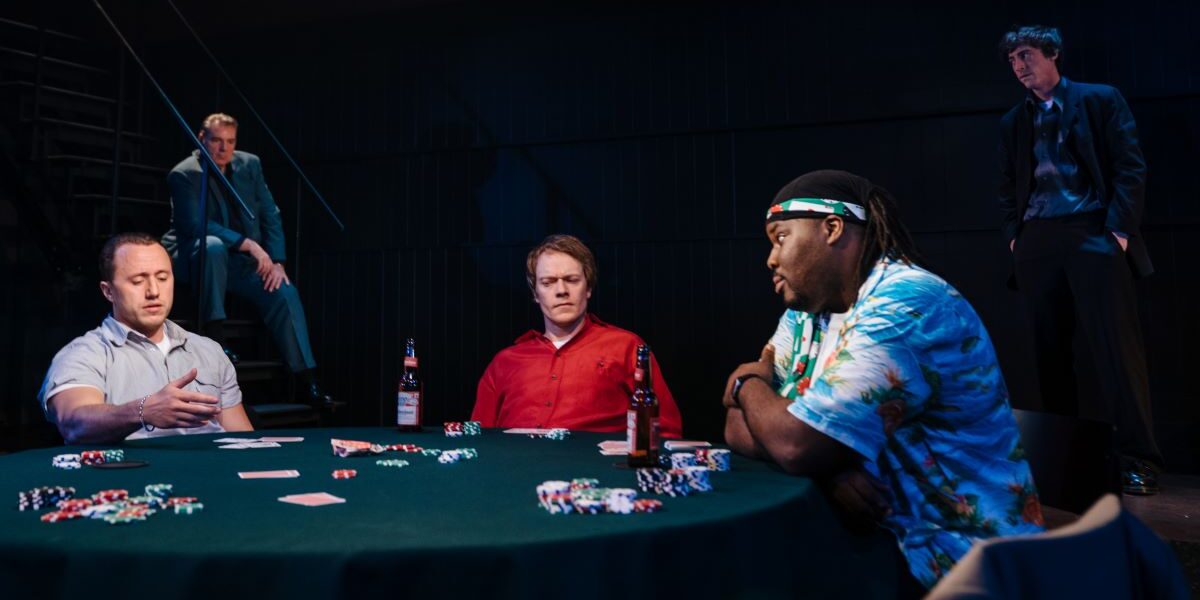Dealer’s Choice was Patrick Marber’s debut play back in 1995. It has had several lauded revivals since then, but the question always remains of how well a play looks some 30 years on from its first night. Will it be dated in setting or tone or social attitudes? Or will it simply seem like a juvenile work in comparison to a storied author’s later writings? I am glad to say that in all important aspects this play retains its visceral power and dramatic force.
In some ways this is surprising, as is the play’s initial success. We are here taken deep into the world of professional poker players with few concessions made, and indeed the whole final act is given over to successive phases of a night-long tussle between seasoned competitors. And yet it works. The characterisations are so detailed and the dialogue so observant and tart that you need no immersion in the technicalities to appreciate the key tensions and conflicts to the fullest extent. Under the surface of the baize lurk unresolved issues between fathers and sons and the full toxicity of male competitiveness when unleashed.
We find ourselves in the first act in a small London restaurant with Stephen, the owner, priding himself on designing a new logo for it. Gradually we are introduced to the staff of the restaurant and to Stephen’s son, Carl, all of whom are dedicated poker players, with differing degrees of skill and indebtedness. We learn that a late-night session is planned which might transform all their fortunes. A mysterious guest, Ash, starts off eating in the restaurant, and then gets invited to join the game.
Moi Tran’s tranformative set comes into its own after the interval – the restaurant floor rises and a basement is revealed with a circular table and refreshments. The game commences, and gradually the characters drop out or drag themselves away up a steep staircase. The only false note is the table revolve which is distracting and unnecessary. The movements of the actors are really sufficient to convey the moods and ebb and flow of the game. The starkness of the surroundings is highly suitable to the final stripped-down patriarchal conflicts and competition of the final minutes where fundamental affections as much as cards are at stake.
The cast is uniformly fine and fire off one another impressively. They relish the precise Pinteresque dialogue with exquisite comic timing, and can change the mood on a sixpence. The stand-out performance without a doubt is Hameed Animashaun as the hapless waiter, Mugsy, ever-optimistic and determined to defy his name, but always out of his depth except in his current job of work. This is a beautifully detailed performance that gives the play its heart and depth. At the opposite ends of the spectrum, Daniel Lapaine and Brendan Coyle as the two buttoned-up father-figures, Ash and Stephen, operate on a slow-burn, which lends their final raw confrontation extra power. Lapaine is particularly impressive in the cruelty of his barbs and his awkward, reluctant generosity. The other roles are more lightly drawn, but Alfie Allen finds a brittle charm in the role of Frankie, Theo Barklem-Biggs evinces a poignant diminishing swagger as Sweeney gradually is crushed by stronger personalities, and Kasper Hilton-Hille finds the charm and neediness of Carl, the son who can never gain his father’s approval.
This is a thoroughly rewarding evening on many levels and truly a must-see in the London Spring Season.
Patrick Marber
Director: Matthew Dunster
Cast: Alfie Allen, Hameed Animashaun, Theo Barklem-Biggs, Brendan Coyle, Kasper Hilton-Hille, Daniel Lapaine
Until 7 June 2025
2hrs 10 mins with interval
Photo Credit: Helen Murray

